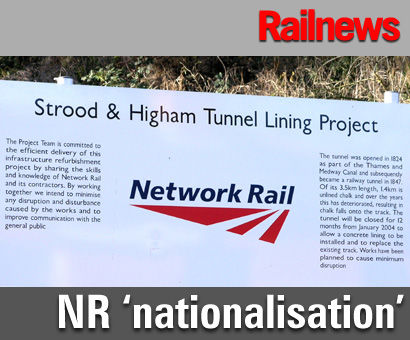UNIONS and transport campaigners have been staging a demonstration today outside the London headquarters of Network Rail at King's Cross as the company passed wholly into the public sector.
The not-for-profit company is now a government body following a change in the way its debt is classified for statistical purposes, but the Department for Transport has denied that the change amounts to full nationalisation, while reports have been circulating that ministers are uncomfortable with the company’s new status.
The major issue which is said to be furrowing brows in Whitehall is Network Rail’s £34 billion debt, which is set to rise to some £40 billion by the end of the present Control Period in 2019.
The Department for Transport and the Treasury have been considering how Network Rail should be controlled in future. One early result was a low-profile statement on 23 April this year that “the Government has now determined that, in future, value for money for the taxpayer will best be secured by Network Rail borrowing directly from the Government, rather than by Network Rail issuing debt in its own name”.
Network Rail’s borrowings will now appear on the public balance sheet, and it is this change which is apparently worrying ministers, who are reported to be discussing a possible u-turn which could be achieved within two years.
However, union leaders say the reform should be a springboard for returning the railways to complete public ownership.
Labour has already said that it would allow a public sector body to compete for future franchises alongside the major transport groups.
But RMT acting general secretary Mick Cash responded: "The recognition of Network Rail as a fully-fledged public body, under public control and ownership, should be seen as the springboard for taking the entire rail network back into the public fold. Any attempt by the right to use this as an opportunity to argue for dragging us back to the lethal days of privatised rail infrastructure under Railtrack will be fiercely resisted.
“The truth is that if the vast sums sucked out of our railways by the private train companies was reinvested in infra-structure, capacity and staffing under a publicly-controlled body we could end the two decades of private profiteering, fragmentation and under-investment which has dragged our railways into the slow lane while charging some of the most extortionate fares in Europe."
Network Rail has made no announcement to mark the change today, but earlier its chief executive Mark Carne said the change meant “greater accountability and transparency to parliament, the tax and farepayer, who rightly deserve to better understand the value of their significant investment in Britain’s booming railway”.
Some industry observers are remaining doubtful. David Moore, specialist rail partner at law firm Clyde & Co, told Railnews: ”Network Rail would like us to believe that the change in its status is something and nothing. They could be right but the reality is probably that some changes are afoot and that it will be some time before we know what they are.
"The DfT have said that they will exercise more control over value for money, which implies less rather than more freedom for Network Rail. The final shape of the arrangements will be set out in an agreement (to be agreed) with a Rail Delivery Authority (to be established) following the passage of legislation (to be enacted). Executives at Network Rail must be returning after the summer wondering what the future holds”
Meanwhile Network Rail opened two more new platforms at London Bridge station this morning as a nine-day part closure of the railway was completed on time. Over the past nine days more than 1,200 engineers worked around the clock through one of the wettest and coldest bank holidays on record, to bring two new platforms into service, lay new track and install a state-of-the-art signalling system. At the same time a triple-track Victorian bridge on the approach to the station was completely rebuilt.


